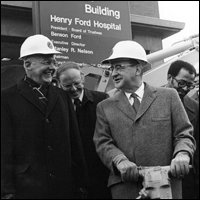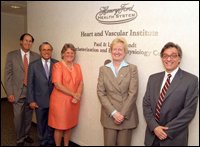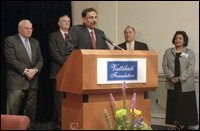A History of Giving
Philanthropy at Henry Ford Hospital
The Ford family
The history of giving to Henry Ford Hospital dates back to its very start. Its formation in 1915 would not have been possible without the generous philanthropy of Henry and Clara Ford and their family. The funds to build and equip the buildings and staff the hospital were furnished by the Ford family. For many years the Fords were presented with deficit reports, which they paid as if they were quarterly bills.
Henry Ford actually did not believe in outright charity and often expressed that view. Nevertheless, he had a deep compassion for the hospital's youngest patients. Friends frequently brought to his attention children with optical or orthopedic disabilities, especially in the area around his vacation home at Richmond Hill, GA. Many of them, along with their parents, were brought to Detroit by train to stay at the hospital where they would be treated. The bills for these children, as well as for some select adult friends of the Ford family, were paid by Henry or Clara Ford.
After the deaths of Edsel (Henry and wife Clara's son) and later Henry and Clara Ford, the Ford family carried on the tradition of giving. Eleanor Clay Ford, the widow of Edsel, remained an active member of the Board of Trustees for 53 years until her death in 1976 and was a generous benefactor of the hospital throughout her life. Their four children, Henry II, Benson, Josephine and William Clay, as they became adults, found their own ways of acting on behalf of the hospital and were generous supporters.

Benson Ford joined the Board of Trustees in 1946, and succeeded his grandfather as its president in 1947. As president of the Board, Benson was instrumental in securing a $100 million grant from the Ford Foundation in 1973. One of his primary interests was furthering the advances being made in medical research. The Education and Research Building at Henry Ford Hospital, a large research lab facility, was dedicated in his name. His wife, Edith McNaughton Ford, also was active on the Board for 36 years and was a benefactor in her own right until her death in 1980.
Henry Ford II, although interested in the hospital, left the management of its affairs to his brother for many years. However, in 1972, he intervened with the Ford Foundation on the hospital's behalf in support of a grant proposal from the hospital. Together with several others, Henry II was responsible for the success of that proposal and the award of the grant. The grant enabled Henry Ford Hospital to greatly expand its research into the treatment of debilitating diseases and laid the foundation of Henry Ford Health to become one of the nation's most prominent and successful health systems.
William Clay Ford and his wife, Martha Firestone Ford, were active benefactors of the hospital. In particular, they were responsible for the hospital's recognition of the need to treat alcohol and chemical dependency. Their commitment resulted in the 1981 establishment of the Maplegrove Center, an inpatient and outpatient substance abuse treatment facility in West Bloomfield. They also served as the honorary co-chairs of the Henry Ford "Fund for the Future," a major fundraising initiative launched in 1994. At its kick-off event in the fall of 1994, William Clay and Martha Ford committed $6 million.
Josephine (Dody) Ford served as a member of the Board of Trustees and, in memory of her late husband Walter B. Ford, donated $4 million to establish a cancer institute at Henry Ford Hospital. Josephine's generous gift, together with the Wendell W. Anderson Chair in Cancer, enhanced the hospital's cancer program, improving patient care and assisting with the hospital's efforts in advancing available treatment in this field. In 1998, Josephine donated $10 million to the cancer institute, which was renamed in her honor.

The fourth generation of Fords continues the philanthropy of their ancestors, many of them contributing to the hospital financially. Lynn Ford Alandt, daughter of Benson and Edith Ford, has been a member of the Board of Trustees. She and her husband, along with Benson Ford, Jr., pledged $5 million in 1994 to establish a Trustees' discretionary fund. In recognition of his many years of service to the hospital and his dedication to its goals and ideals, this was named for their father as the Benson Ford Fund.
The Office of Philanthropy
With the Ford Foundation's grant of $100 million in 1973 came several requirements, one of which was that a Development Office be established to solicit and maintain donations and donor relationships. The money from the Ford Foundation grant was used, in part, to establish "The Fund for Henry Ford Hospital." This was initially capitalized, beginning in 1973, with $75 million which was paid over the next ten years in annual installments of $7.5 million. More than $124 million in earnings from this fund supported increases in clinical research, basic biomedical research and medical education programs between 1984 and 1994. It funded a topical magnetic resonance facility for brain research, a growing biostatistics and clinical epidemiology staff and many NIH-supported research projects, especially in the areas of cancer, bone and hypertension. In spite of the significance of these expenditures, the fund increased with prudent management and was valued at almost $257 million in 1997.
During the 1970s and 1980s, the Development Office staff established and maintained many important donor relationships with individuals, organizations and members of the corporate community. These donors were educated about the need to fund growth of the hospital's basic and clinical research in order to increase its stature. The Endowed Chairs program, created as part of the hospital's 75th Anniversary celebration, was launched in 1990 and funded 15 chairs at $1 million each.

The late '90s and the new millennium marked a time of substantial donations to establish or further enhance the system's centers of excellence. In 1999, friends and family of David Hermelin, ambassador to Norway, pledged $10 million to create a brain tumor research center at Henry Ford. That same year, the Department of Neurology was awarded a $1 million endowment by the late William T. Gossett -- a prominent Detroit attorney and former president of the American Bar Association -- to advance research in Parkinson's disease. Then in 2001, Raj and Padma Vattikuti donated $20 million to support research and treatment of urological cancers at Henry Ford Hospital.
In 2002, the Josephine Ford Cancer Institute broke ground on a $2 million expansion project at the Henry Ford Medical Center in West Bloomfield. The center is named the 'Williams International Cancer Wing', in honor of the the Williams International Company, which pledged $1.5 million for the addition.
Within the past couple of years, generous donations have come from within the organization and from outside individuals and corporations. In the fall of 2004, the Office of Philanthropy coordinated efforts with the Employee Community Giving Campaign Committee. For the first time, employees had several Henry Ford Health initiatives and programs as choices for their contributions. The 2004/2005 Employee Community Giving Campaign was the most successful year since the inception of the campaign. More than 5,700 employees, physicians and system leadership contributed more than $1.2 million to support system initiatives and community partner organizations.
Furthermore, the John and Margrite Davis family, through their estate, made a $1.2 million donation to Henry Ford Hospital's Department of Neurosurgery. The Ford Motor Company Fund made a donation of $2 million to establish the Breast Imaging Center at Henry Ford Medical Center - Fairlane. With an additional commitment of $1 million over the next several years from the Ford Fund, the Josephine Ford Cancer Institute has been able to embark on an expansion of its clinical trials program. Plus, a $1.4 million gift from Robert and Marjorie Herndon, long-time supporters of Henry Ford Health, helped to endow a chair in oncology research.
On any given day, Henry Ford contributes more than $250,000 in care to uncompensated, under-compensated or underinsured individuals of all ages and backgrounds. All the gifts to Henry Ford Health help to make that care possible, as well as enhance the possibility for medical, technological and research advancements that not only impact Henry Ford's community, but the world of healthcare in general.
Photos: © Property of Henry Ford Health Conrad R. Lam Archives, All Rights Reserved
.svg?iar=0&hash=F6049510E33E4E6D8196C26CCC0A64A4)

/hfh-logo-main--white.svg?iar=0&hash=ED491CBFADFB7670FAE94559C98D7798)